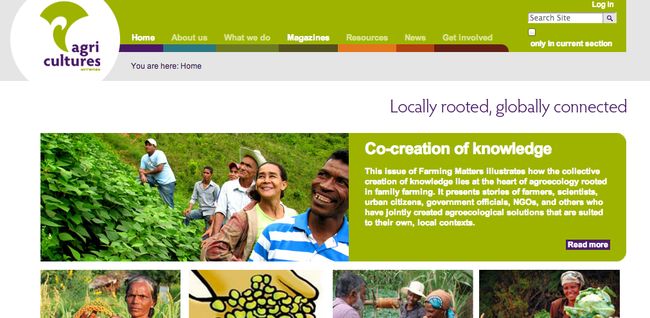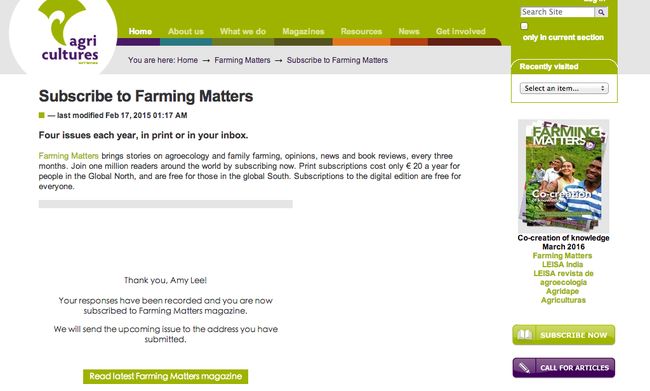这是第五周的一节课程,Food security governance networks and learning,是关于粮食安全网络的管理和学习的议题。原本看到Food security,以为是食品安全,看到governance,以为是治理就是防治食品安全事故,看到networks,又以为是互联网学习之类。后来结合全部的内容,这篇更多的说的是搭建一个粮食安全的网络,这个安全,包括了食物主权,而网络的意思,更接近是一个系统。
所以,这节讲的更多的是,在一个地区,如何进行粮食安全系统的管理和学习。
[导师】
导师mutizwa mukute,是罗德斯大学副研究员。他主要的研究方向是农业和自然资源管理。出版过《可持续发展工作研究——一种能使集体农业创新的工具》
(个人理解不一定对,建议参考英文原文。不过个人很好奇,在这一章的导师上,倒不是一个监管,或者鉴别的角度,而是选择一个可持续发展的角度。罗德斯大学(Rhodes University)是南非著名的百年名校)。
Mutizwa Mukute is a research and development consultant and a Rhodes University research associate with over 25 years experience in supporting learning, innovation and agency development in the agriculture and natural resources management sector. He has served as a Board member of several regional and international organisations and recently published a book entitled:Developmental Work Research – A Tool for Enabling Collective Agricultural Innovation.
【课程】
【延伸阅读】
1、http://www.ru.ac.za/elrc/
Environmental Learning Research Centre (ELRC)
罗德斯大学环境学习研究中心
2、Anderson, C., Pimbert, M., & Kiss, C. (2015).Building, defending and strengthening agroecology: A global struggle for food sovereignty. Wageningen/Coventry: ILEIA/Centre for Agroecology, Water and Resilience.
链接
《建设、维护和强化农业生态学》
agroecology is inseparable from food sovereignty: the right of citizens to control food policy and practice.
农业是离不开粮食主权:公民权控制食品政策与实践。
3、Mukute, M. (2013). Bridging and enriching top-down and participatory learning: The case of Organic Conservation Agriculture farmers in Zimbabwe.Southern African Journal of Environmental Education 29 & 30, 2012/13
链接
全员学习和参与式学习在津巴布韦小农有机农业中的应用
1、全员学习:选出农民的代表,在培训中心接受培训,然后回到各自的农民协会,培训其他农民在他们学到的东西。
The top-down approach involves farmer representatives, known as ‘access farmers’ in the project, undergoing training at training centres and then returning to their respective farmer associations to train other farmers in what they have learnt.
2、参与式学习:在农场内的组织学习、培训,获得农作经验。
Participatory learning includes farmer-to-farmer learning within and among associations, and trainers learning from, and acting on, farmer experiences.
4、生态农业网络
http://www.agriculturesnetwork.org/
分享小规模家庭农业与农业生态知识。
农业网络已经遍布世界各地:巴西、埃塞俄比亚、印度的成员,荷兰,秘鲁和塞内加尔。以在荷兰的办公室作为网络秘书处。
持续出版可持续农业杂志,今天在全球范围内达到了约一百万名读者。开展了不同的项目和活动。
网站也提供一部分视频资源http://www.agriculturesnetwork.org/resources/videos
可以免费订阅电子版杂志,用QQ邮箱可以订阅,不过会在垃圾信箱里面,要及时查看。
经过各种努力,终于在issuu这个网站上,找到以荷兰可持续农业学习中心杂志ILEIA为基础,由社区伙伴支持、中国科学院昆明植物研究所及云南省生物多样性和传统知识研究会合作出版社出版的季刊《可持续农业》。在这里也要特别感谢国外很多网站的域名路径设置非常严谨,所以经过各种猜测和测试可以分析出文件所在的路径。
https://issuu.com/agricultures
【讨论】
Food security governance networks and learning Discussion
Identify at least three kinds of justice/injustice that are evident in the Zimbabwe food security case study.
列举在津巴布韦食品安全案例研究中,至少三个公正或不公正的因素。
(讨论也没有从安全或者不安全去出发,而是讨论公正或者不公正)
个人水平有限,如有疏忽,如果你是的用户,欢迎在评论留言探讨
也可以通过下面的方式联系我:
微信:liliqiong007(添加请注明“环境教育”)
李丽琼 记于2016年3月13日




